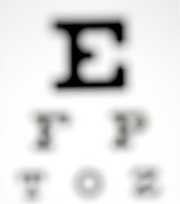 What is Blurry Vision?
What is Blurry Vision?Blurry vision is a common side effect that affects the eyes by decreasing the ability to see, making things appear out of focus, and reducing the ability to see details. Blurriness may be caused by neurological disorders, infections, autoimmune problems or average vision trouble. Although vision problems are typically genetic, blurry vision may be a sign of serious health conditions.
Blurred vision may be caused by the following:
Patients with blurry vision should determine the cause of their vision changes in order to properly treat their condition. If you have recently begun taking a medicine that has a side effect of blurry vision, consult your doctor about changing your dosage or ending your use of the drug if necessary. Continual blurry vision should be examined by an optometrist (eye doctor) to treat the underlying condition.
Further vision impairment may be prevented by wearing sunglasses, avoiding alcohol and smoking, treating any blood pressure, cholesterol or blood sugar problems ou may have, and increasing your intake of antioxidants.